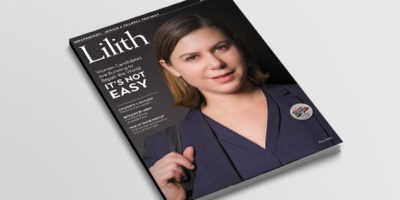Call and Response
My African-American Grandmother Prayer A Jewish Prayer
A little girl is sitting beside her mother in church, in Washington, D.C., her home town. The preacher is telling the story of how Moses asks to see God face to face. The little girl is five years old. When she was three she saw her infant brother dead in his cradle, his skin all blue. She cannot figure it out. She leans forward on the pew, listening. She leans forward and somehow she is on a mountain, and Moses is there talking to a God he cannot see. She is amazed. She watches and listens for a moment, and then she is back on the pew beside her mother, wondering if everyone in the church is amazed. To Sinai and back, just like that.
She writes a chapbook of poetry when she goes to college at Howard University, and she entitles it, Sojourner. In her mind she is sojourning in the wilderness with the Hebrews as she transfers and advances from college to university: Eastern Baptist, Villanova, the University of Pennsylvania.
She loves literature, she loves poetry, she loves epic, she loves languages: Phillis Wheatley, John Milton, Paradise Lost, Homer, Dante, Genesis, Thomas Mann. Carlos Fuentes, Terra Nostra. Call and response. Greek, Latin, Hebrew, French, Spanish, English. She sits at a window in New Mexico, overlooking a desert, reading Thomas Mann’s Joseph and His Brothers. These works, authors, disciplines constitute the call, her response is Asenath and Our Song of Songs. The fictionalized autobiography of an African and American woman linking herself to Judaism. The story of Egyptian Asenath who marries Joseph.
Once in South Hadley, Massachusetts, she finds herself in a group discussion in a Congregational Church. One man says, “My mother is Jewish, my father is Christian—and I’m here because I’ve decided to be Christian.” She says, “If I had a choice, I would be Jewish.” And then she says to herself, “Then what am I doing here?” The next day she goes to Rabbi Carolyn Braun and begins her formal journey into Judaism. And Julius Lester also comes to her and speaks to her of the journey to Judaism, voice to ear, and through his book, Lovesong.
Her Asenath book keeps trying to finish itself, keeps trying to reach the end of the story. She has published half of it as Asenath and the Origin of Nappy Hair. She has published another quarter of it as PeacesongDC. There is one more part to come. It is her story celebrating African American culture, Judaism, epic literature and academia. The end of the story is on its way to you.
When she was a little girl she would sit on the side of her father’s chair while he told her stories of Herodotus and Frederick Douglass and the Song of Roland and Charlemagne and Timbuktu and her parents told her that her nappy hair is like the hair of Beowulf and Samson and Chaka the Great. There are two special books that a Jewish bookstore owner made her father buy. Yes, made him! When he was a boy her father went to the bookstore to buy books about sports but this one time the store owner says, “No, don’t buy those books, buy these books by Dunbar and Douglass.” She believes that the bookstore owner knew that she would be born one day and so sent those books to her through her father.
Once in South Hadley, on erev Shabbat, her parents visit from Washington, D.C., and sit with her as she prays over the Shabbat candles. Her father says, “My mother always prayed that prayer on Fridays.” What? Her Methodist Christian grandmother prayed a Jewish prayer over the candles? Yes. A search through memories and libraries gives the answer. Her great grandmother’s great grandmother is Sarah Shulamit bat Asher. In every generation a Shulamit or an Olivia, always. From Spain to Portugal to Italy to Libya to the Geechees on the Georgia Sea islands, Olivia, Peace, Shulamit. Carol Olivia. Daughter of Oscar. A Song of Peace, may it be so. She names the book tracing her personal Jewish story, PeacesongDC, to attach it in genre to Lovesong by Julius Lester, of blessed memory.
She hopes it will not be long before she shares the rest of the story with you.
Shalom, Carolivia, Shirah Shulamit.
Among Carolivia Herron’s many books are Nappy Hair and Let Freedom Sing: The Biography of Marian Anderson. She lectures widely on Judaic and other subjects.



